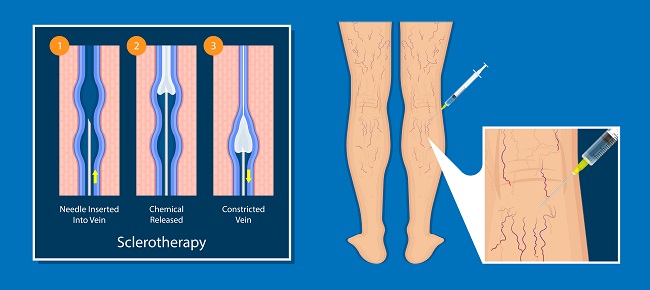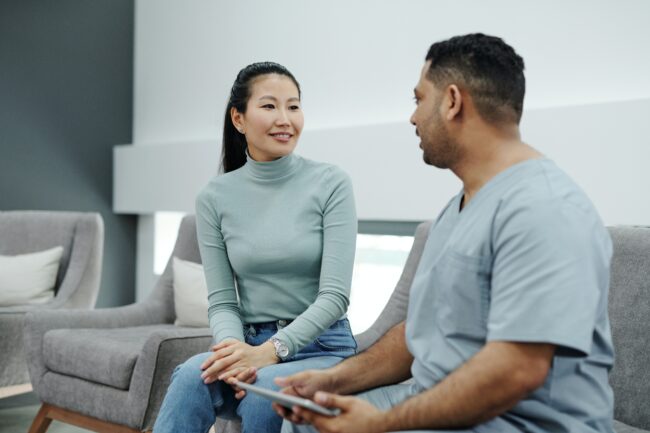Venous sclerotherapy is one of the better-known spider vein treatments. But is sclerotherapy effective for varicose veins? Read on to find out.
What is Sclerotherapy?

Infographic of the sclerotherapy treatment process for varicose veins
Sclerotherapy involves injecting a sclerosant into the vein. The sclerosant works by agitating the vein walls and prompting the formation of blood clots to seal the problem varicose vein off from the rest of your circulatory system. Once this vein is sealed, your body will automatically reroute blood flow through nearby veins and absorb the sealed one.
Types of Sclerotherapy
Below are some treatments involving sclerotherapy:
Liquid sclerotherapy
Liquid sclerotherapy is best suited for spider veins and smaller feeder veins. It involves injecting a sclerosant solution (namely Sodium tetradecyl suplhate or Aethoxysklerol) into the vein to irritate it and seal it shut. However, it’s not an ideal treatment for varicose veins, as liquid sclerosant can’t cover enough area to create an effective vein seal.
Foam sclerotherapy
As the name might suggest, foam sclerotherapy involves mixing a sclerosant with oxygen or other gases to create a foamy substance. The foam can cover a larger area than liquid sclerosant, thus making it a viable treatment option for some varicose veins.
ClariVein
While technically classed as its own treatment, ClariVein does require sclerosant. Basically, ClariVein is a specialised catheter with a rotating tip, capable of delivering sclerosant deeper into the varicose vein.
How effective is Sclerotherapy for varicose veins?
The effectiveness of sclerotherapy depends on the vein’s size. It’s most effective for treating narrow veins like spider veins and smaller varicose veins.
You can expect a sclerotherapy session to get rid of 50-80% of smaller varicose veins (please note, however, that sclerotherapy often involves 2-3 treatments). And generally, the success rate will be higher for ClariVein and foam sclerotherapy treatments done on varicose veins. Please note that the results will not be immediate, but you’ll likely see an improvement within 6 weeks of the procedure.
That said, as with any varicose vein treatment, you can’t rely on the procedure alone. We will prescribe you a post-op care plan to follow to ensure the vein seal holds.
Sclerotherapy Aftercare
What to do after sclerotherapy:
- Take a 30-minute walk every day for at least a week
- Drink plenty of water
- Elevate your legs above heart level for a few minutes a day
What to avoid after sclerotherapy:
- Prolonged sitting, standing, and strenuous exercise for 3-5 days after treatment
- Avoid anti-inflammatory medication for 48 hours before and after treatment. Sclerotherapy relies on blood clotting to form the vein seal, so anti-inflammatories like ibuprofen and aspirin can compromise it.
Sclerotherapy side effects
You may experience some aches and swelling after the procedure. These are perfectly normal and are simply a sign of the healing process taking place. These symptoms can be managed by elevating the legs, wearing the compression wrap we supply, and taking over-the-counter pain relief (with your treating doctor’s approval).
You may also experience some side effects like:
- Bruising
- Pigmentation
- An allergic reaction to the solution. An allergic reaction is unlikely as we will conduct an allergen test during your consultation.
Should I get Sclerotherapy?

Patient speaking to a nurse in a clinic waiting room
On that note, sclerotherapy won’t be the best option for you if:
- Your varicose veins are too large for it to be effective
- You’re allergic to the sclerosant
- You have a blood clotting disorder or DVT
But don’t worry. We’ll help you determine if sclerotherapy is right for you during your consultation. And if it’s not, there are a few other effective and minimally invasive treatment options.
Ready to take the next step?
Book your consultation by calling 13 VEINS (13 83467) or filling out the booking form below.